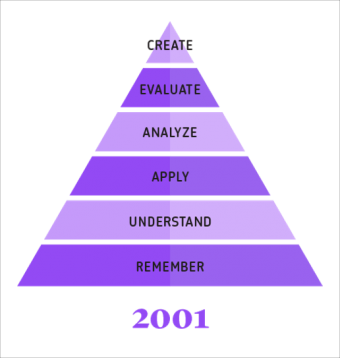In every imaginable life path or career journey, people benefit from developing critical thinking. The ability to analyse and evaluate can serve us well, no matter where life takes us. Analytical and evaluative skills sit near the apex of Bloom’s Revised Taxonomy for Learning, the framework teachers use to design educational experiences that challenge learners. In teaching JURD7224/LAWS1091 Business Associations, convener Professor Dimity Kingsford Smith and Teaching Fellow Michael Neylan from the Faculty of Law knew that writing “analyse” or “evaluate” into course learning outcomes could only be the first step in creating opportunities for students to build critical thinking skills. The participation element of the course, designed by Associate Lecturer Carol Lawson, offered a space for students to attain invaluable base learning layers of “understanding” and “applying” ideas about corporations, and rules for solving corporations law problems.
UNSW Law Learning Design referred the teaching team to experts Dr Faisal Khattak and Mr Martin Parisio from the Law team in EDDS, PVC(E) for help combining multiple tools in a single integrated activity. Each week, students did a Moodle Quiz to confirm their working knowledge of the content. Quiz completion opened access to a Discussion Forum where each student was required to compose a thoughtful and well-crafted answer post of up to 200 words for Class Participation credit. By analysing students’ answers, the teaching team could see in real time which concepts the student had (or had not) understood well enough to effectively apply, analyse and evaluate them.
Rules for engagement were inbuilt: for example, students could only view classmates’ Discussion answers after posting their own. This helped to create a mutually supportive learning community, where, in Carol’s words, “they all independently attempted the same short task for a guaranteed reward with low risk, and saw the merits and flaws of each other’s answers in light of our feedback posts.” Teachers posted collective feedback each week, highlighting astute answers and clearing up misunderstandings. In this way, the teaching team positioned growth as a vital part of the learning process.
Integrating the Quiz and Forum into a combined activity proved successful for the course. Student participation was soon almost universal, with strongly positive student feedback. According to Carol, “The weekly Discussions were where we saw great dividends as teachers.” She continues, “We gained rich data about what each of our invisible students needed and could deliver it through our weekly feedback posts. And they could in effect teach each other too.” An added plus was the convenient method of grading the discussion forum posts using the automatic flow to the Gradebook. By engaging all students early, the integrated activity maximised the time that students had to attain base knowledge and learn to apply it confidently. The Forums also provided a low-risk guaranteed-reward platform for all students to learn from each other.
For support or one-on-one training in developing integrated learning solutions for a fully online course, reach out to the EDDS, PVC(E) team through the Educational Solutions consultation form.
Professor Dimity Kingsford Smith teaches in the areas of corporations law and corporate governance. She holds the Minter Ellison Chair of Risk and Regulation at UNSW, a research position supported since October 2018 by Minter Ellison’s philanthropic gift.
Associate Lecturer Carol Lawson teaches corporations law. She is experienced in remote tertiary teaching and learning in two disciplines, and is completing a PhD in regulation and global governance.
Dr Faisal Khattak (AFHEA) is an Educational Developer in Educational Design and Delivery Services, PVC(E). He is an experienced teacher with a Bachelor of Education and is passionate about developing content for tertiary education.
Mr Martin Parisio is an Educational Developer in Educational Design and Delivery Services, PVC(E). Martin has an extensive background in educational design and development within the University sector. Martin’s focus is teacher development and learning. He is an Associate Fellow of Advance Higher Education and is completing his PhD in Design for Learning.




